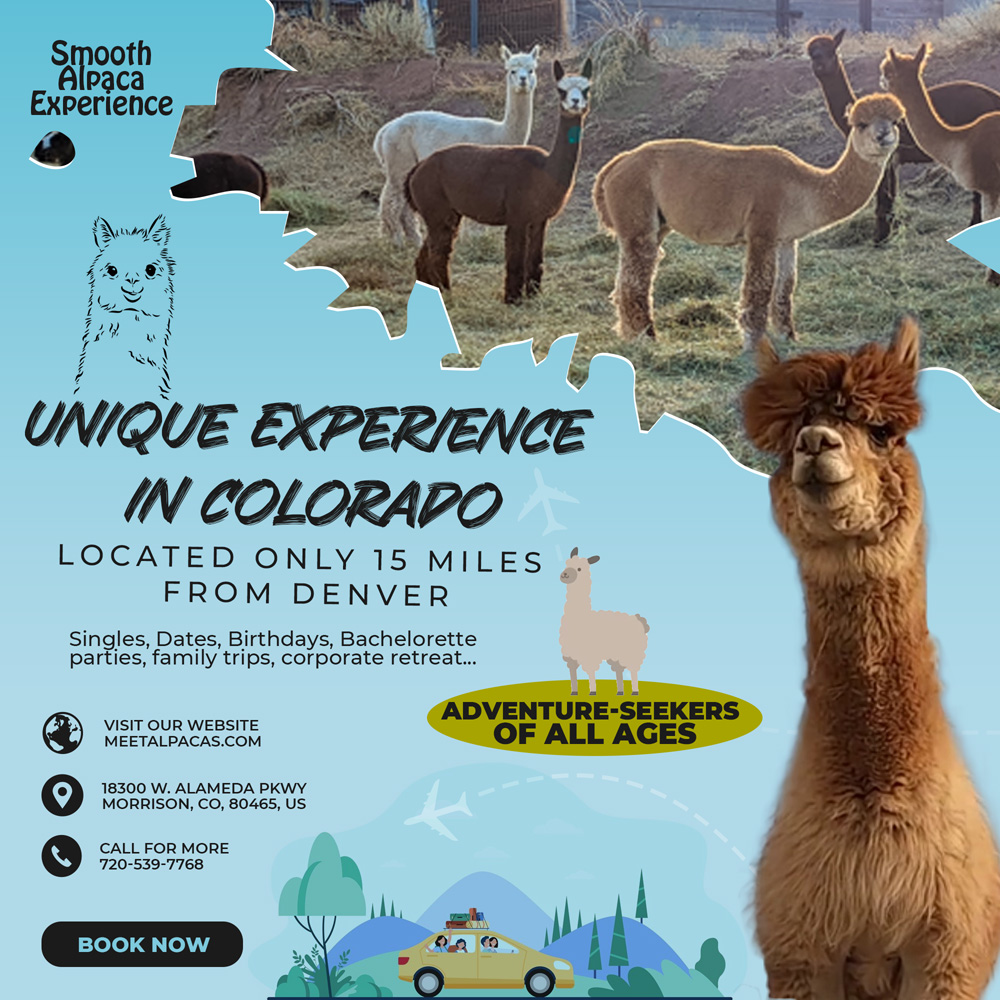Denver, Colorado alpaca adventures with meetalpacas.com: Whether you’re looking for a new hobby or a career, alpaca farms provide a unique opportunity to explore your passions. You’ll be amazed at how rewarding it can be to care for these gorgeous creatures and the positive impact that they have on the people and land around them. Alpaca farms align with the growing global trend towards sustainability, and they offer a unique way to engage in ethical living. So, what are you waiting for? Check out an alpaca farm near you today! Read even more details on alpacas farm in Colorado.

Alpacas are also easy to handle and respond well to the farmers’ gentle handling techniques, especially when food is involved. In fact, they are much easier to train than llamas or cows and are usually eager learners. However, like any animal, they are wary of people and must be carefully handled. They may spit if they are not trained properly (although they don’t spit as often as llamas or cows). It takes time to build trust with the herd. Alpacas need to know they are safe and loved. A good way to facilitate this is by spending lots of time with them, letting them come to you, and interacting with them. Alpacas are incredibly curious animals, and they enjoy exploring their surroundings.
Are you planning a trip to the Mile High City? Most people pack their itinerary with a Colorado Rockies baseball game, a concert at Red Rocks Park and Amphitheater, and a hike at Rocky Mountain National Park in addition to all of Denver’s museums and botanical gardens. Yet, if you’re looking for an off-the-beaten-path adventure, you can’t miss an alpaca experience. Over the last several decades, Denver has become home to these gorgeous animals because Colorado’s arid climate mimics that of their native habitat.
For many years, zoologists assumed alpacas and llamas had descended from guanacos, and they were classified in the genus Lama. However, in a 2001 paper titled “Genetic analysis reveals the wild ancestors of the llama and the alpaca” in the journal Proceeding of the Royal Society B, researchers showed there is “high genetic similarity” between the alpaca and the vicuña, and between the llama and the guanaco. They recommended that the alpaca be reclassified as Vicugna pacos.
Additionally, if you love seeing and interacting with animals, an alpaca farm provides a hands-on experience. You can hand-feed your new friends a healthy snack and hang out with them while they provide amusing entertainment. It provides you with the chance to interact with the ranch: Most people don’t know a lot about alpacas before they visit the ranch. Alpacas originate from South America, and they’ve been brought to Colorado over the last several decades. The climate of Colorado is perfect for the alpaca, so they’re content living on ranches in Denver. Are you looking for an educational opportunity for your kids? Come enjoy an alpaca experience that’s not only fun but also informative. This alpaca experience takes place on a fiber farm. This type of farm raises animals like alpacas, sheep, goats, llamas, angora rabbits, and more for their fleece and wool.
Do alpacas make noise? Alpacas are very quiet, docile animals that make a minimal amount of sound. They do make a humming sound as a means of communication or to express concern or stress. Most communication between alpacas is nonverbal. Occasionally you will hear a shrill “alarm call,” which usually means they have spotted something of concern nearby, and they are warning others in the herd. The concern may be a predator, or may be something they are not familiar with, like a cow or horse in a neighboring field. Male alpacas also “serenade” females during breeding with a guttural, throaty sound called “orgling.” Find more info on meetalpacas.com.
Are alpacas dangerous? No. Alpacas are pleasant to be around and generally easy to handle. Alpacas do not head-butt. They do not have horns or hooves like other livestock. They move gracefully and adroitly about the field and are therefore unlikely to run into or over anyone intentionally. Males develop sharp fighting teeth at about three years of age which can cause injury to both humans as well as other alpacas. Alpacas will reflexively kick with a hind leg, particularly if surprised from behind. While the impact of an alpaca kick is not on par with a horse, it can create a bruise. Also, there is potential for toenails to cut skin.
Alpacas have two sets of teeth for processing food. They have molars in the back of the jaw for chewing cud. In the front, alpacas have teeth on the bottom only and a hard gum (known as a dental pad) on the top for crushing grain, grass, or hay. Unlike goats and sheep that have long tongues which can rip plants out of the ground, alpacas have short tongues and nibble only the tops of grasses and other plants. This results in less disturbance of the vegetation. Alpacas will often eat shrubs or the leaves from trees if given the opportunity. This requires monitoring to ensure they do not consume harmful products.
Alpacas are very social creatures. They are gentle and curious and with training can become great pets, according to Switzer. Herds often include animals of different species or taxonomic families, such as llamas, goats and sheep, according to the FAO. Alpacas spit when they are distressed or feel threatened. They will sometimes spit at each other when they are competing for food or trying to establish dominance, according to Switzer. They won’t spit at people or bite unless they have been abused.
